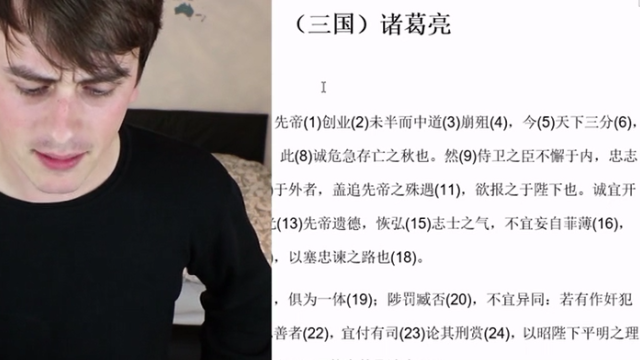【经典名著阅读】《红字》第十三章(上)
作者:Nathaniel Hawthorne
2011-08-23 10:00
Chapter 13 ANOTHER VIEW OF HESTER
第十三章 海丝特的另一面
IN her late singular interview with Mr. Dimmesdale, Hester Prynne was shocked at the condition to which she found the clergyman reduced. His nerve seemed absolutely destroyed. His moral force was abased into more than childish weakness. It grovelled helpless on the ground, even while his intellectual faculties retained their pristine strength, or had perhaps acquired a morbid energy, which disease only could have given them. With her knowledge of a train of circumstances hidden from all others, she could readily infer that, besides the legitimate action of his own conscience, a terrible machinery had been brought to bear, and was still operating, on Mr. Dimmesdale's well-being and repose. Knowing what this poor fallen man had once been, her whole soul was moved by the shuddering terror with which he had appealed to her- the outcast woman- for support against his instinctively discovered enemy. She decided, moreover, that he had a right to her utmost aid. Little accustomed, in her long seclusion from society, to measure her ideas of right and wrong by any standard external to herself, Hester saw- or seemed to see- that there lay a responsibility upon her, in reference to the clergyman, which she owed to no other, nor to the whole world besides. The links that united her to the rest of human kind- links of flowers, or silk, or gold, or whatever the material- had all been broken. Here was the iron link of mutual crime, which neither he nor she could break. Like all other ties, it brought along with it its obligations.
在海丝特·白兰最近园丁梅斯代尔先生的那次独特的会面中,她发现牧师的健康状况大为下降,并为此深感震惊。他的神经系统似乎已彻底垮了。他的精神力量已经衰颓,低得不如孩子。虽说他的智能还保持着原有的力量,或者说,可能已经达到了只有疾病才会造成的一种病态的亢奋,但他的精神力量已经到了无能为力的地步了。由于她了解一系列不为他人所知的隐情,她立即推断出,在丁梅斯代尔先生自己良知的正常活动之外,他的宁静已经受到一部可怕的机器的干扰,而且那机器仍在开动,他还得忍受。由于她了解这个可怜的堕落的人的以往,所以当他吓得心惊胆战地向她——被人摒弃的女人——求救,要她帮他对付他靠本能发现的敌人的时候;她的整个灵魂都受到了震动。她还认为,他有权要她倾力相助。海丝特在长期的与世隔绝之中,已经不惯于以任何外界标准来衡量她的念头的对或错了,她懂得——或者似乎懂得——她对牧师负有责任,这种责任是她对任何别人、对整个世界都毋庸承担的。她和别的人类的任何联系——无论是花的、是丝的、是银的,还是随便什么物质的——全都断绝了。然而他和她之间却有着共同犯罪的铁链,不管他还是她都不能打破。这一联系,如同一切其它纽带一样,有与之紧相伴随的义务。
Hester Prynne did not now occupy precisely the same position in which we beheld her during the earlier periods of her ignominy. Years had come and gone. Pearl was now seven years old. Her mother, with the scarlet letter on her breast, glittering in its fantastic embroidery, had long been a familiar object to the townspeople. As is apt to be the case when a person stands out in any prominence before the community, and, at the same time, interferes neither with public nor individual interests and convenience, a species of general regard had ultimately grown up in reference to Hester Prynne. It is to the credit of human nature, that, except where its selfishness is brought into play, it loves more readily than it hates. Hatred, by a gradual and quiet process, will even be transformed to love, unless the change be impeded by a continually new irritation of the original feeling of hostility. In this matter of Hester Prynne, there was neither irritation nor irksomeness. She never battled with the public, but submitted, uncomplainingly, to its worst usage; she made no claim upon it, in requital for what she suffered; she did not weigh upon its sympathies. Then, also, the blameless purity of her life during all these years in which she had been set apart to infamy, was reckoned largely in her favour. With nothing now to lose, in the sight of mankind, and with no hope, and seemingly no wish, of gaining anything, it could only be a genuine regard for virtue that had brought back the poor wanderer to its paths.
海丝特·白兰如今所处的地位已同她当初受辱时我们所看到的并不完全一样了。春来秋往,年复一年。珠儿此时已经七岁了。她母亲胸前闪着的刺绣绝妙的红字,早已成为镇上人所熟悉的目标。如果一个人在大家面前有着与众不同的特殊地位,而同时又不干涉任何公共或个人的利益和方便,他就最终会赢得普遍的尊重,海丝特·白兰的情况也正是如此除去自私的念头占了上峰、得以表现之外,爱总要比恨来得容易,这正是人类本性之所在。只要不遭到原有的敌意不断受到新的挑动的阻碍,恨甚至会通过悄悄渐进的过程转变成爱。就海丝特。白兰的情况而论,她既没受到旧恨的挑动,也没有增添新的愠怒。她从来与世无争,只是毫无怨尤地屈从于社会的最不公平的待遇;她也没有因自己的不幸而希冀什么报偿;她同样不依重于人们的同情。于是,在她因犯罪而丧失了权利、被迫独处一隅的这些年月里,她生活的纯洁无理,大大地赢得了人心。既然她在人们的心目中已经再无所失,再无所望,而且似乎也再无所愿去得到什么,那么这个可怜人的迷途知返,也只能被真诚地看作是美德感召的善果了。











